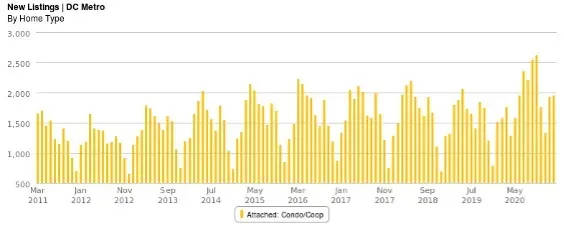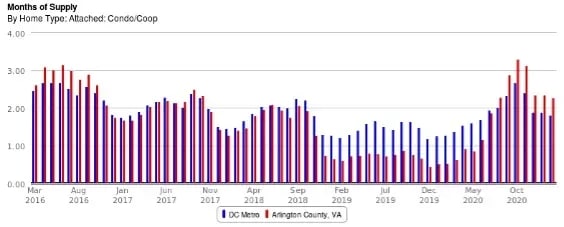Question: How has the market for high-rise condo buildings compared to low-rise/smaller condo communities through the pandemic?
Answer: The condo market began to turn last summer and got progressively worse through November/December, but has improved slightly and stabilized a bit since December. The next few months will give us a lot of good information on whether the condo market will improve or if we can expect a rebalancing as buyer priorities shift more permanently due to their COVID experiences and new telework policies.
This week I took a look at some of the underlying condo market data to see if there has been a noticeable difference in how garden/townhouse-style (garden-style = low-rises of 1-4 stories) condo communities have performed compared to mid/high-rise buildings. I also broke down the condo market by bedroom to see if one-bedrooms have been impacted more than larger two and three bedrooms units.
Arlington/DC Metro Condo Market Overview
First, let’s take a zoomed-out look at the Arlington and DC Metro markets. We are still experiencing a rush out of condos (see first chart, New Listings), with the DC Metro and Arlington both recording record-highs in total condos listed for sale in January and February. The reasons for this range from people seeking more space/yard to investors unable to find tenants.Months of Supply (measure of supply and demand) shown in the second chart shows us that Arlington experiences a slightly worse (for sellers) condo market than the DC Metro overall after experiencing a much stronger market from late 2018-early 2020 in the wake of Amazon’s HQ2 announcement. Both markets have shown signs of stabilizing over the last few months, after getting progressively worse each month in the 2nd half of 2020.


Garden/Townhouse-Style vs Mid/High-Rise
The overall Arlington condo market is sitting at about 2.25 Months of Supply, still well below the 6 Months of Supply deemed by economists to be a balanced market for buyers and sellers. As of this writing, the mid/high-rise market has about 2.6 Months of Supply and the garden/townhouse-style condo market is sitting at 1.3 Months of Supply, making it a pretty good market to sell into.Historically, the garden/townhouse-style market has performed better (faster sales, more competition/seller leverage) than the mid/high-rise market so the difference in Months of Supply doesn’t indicate a COVID-related shift. As you’ll see in the table below, the differences between the garden/townhouse-style condo market and the mid/high-rise market have remained relatively similar each year from pre-Amazon (2018) through the Amazon surge (2019) and now into the COVID-related pullback (2020).
| Contract Year/ Type | Avg Sold to Original Ask | Avg Days on Market | % Sold in 1-10 Days |
| 2018 | |||
| Garden/Townhouse-Style | 98.4% | 27 | 46% |
| Mid/High Rise | 97.5% | 45 | 34% |
| 2019 | |||
| Garden/Townhouse-Style | 100.8% | 13 | 73% |
| Mid/High Rise | 99.3% | 23 | 59% |
| 2020 | |||
| Garden/Townhouse-Style | 99.7% | 14 | 65% |
| Mid/High Rise | 98.4% | 29 | 47% |
| 2021 | |||
| Garden/Townhouse-Style | 98.7% | 36 | 48% |
| Mid/High Rise | 97.7% | 43 | 36% |
Condo Market Performance by Bedroom Count
I also took a similar look at the Arlington condo market by bedroom count. Months of Supply for one-bedrooms is highest at 2.5, followed by two-bedrooms at 1.8, and then three-bedrooms at 1.7. The early data for 2021 suggests that one-bedroom condos will suffer more in the market than larger two and three bedroom units, which makes sense from a COVID standpoint because most one-bedroom units don’t have a good dedicated office space.
| Contract Year/ Bedroom Count | Avg Sold to Original Ask | Avg Days on Market | % Sold in 1-10 Days |
| 2018 | |||
| 1 | 97.7% | 36 | 37% |
| 2 | 98.4% | 36 | 41% |
| 3 | 97.5% | 32 | 47% |
| 2019 | |||
| 1 | 100.2% | 17 | 65% |
| 2 | 100.3% | 17 | 67% |
| 3 | 98.1% | 35 | 55% |
| 2020 | |||
| 1 | 99.0% | 21 | 57% |
| 2 | 99.2% | 22 | 56% |
| 3 | 98.8% | 24 | 59% |
| 2021 | |||
| 1 | 97.5% | 48 | 32% |
| 2 | 98.4% | 35 | 47% |
| 3 | 99.9% | 32 | 56% |
I do expect the condo market to improve over the next few months as more people are vaccinated and warmer weather allows people to return to some semblance of a normal life, and thus buying behavior that is more reflective of pre-COVID times. However, I think that how employers choose to handle telework long-term will ultimately determine whether we will experience a full return to the pre-COVID market or if we are going to see a more permanent rebalancing of condo values as commutes/convenience become less of a priority for buyers if they are no longer coming into an office every week.
If you’d like to discuss buying, selling, investing, or renting, don’t hesitate to reach out to me at [email protected].




